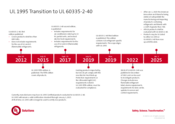
Roadmap for UL 60335-2-40 - EN
Advisory, training, benchmarking, testing, assessment and certification services for low GWP refrigerants.

Refrigerants with low global warming potential (GWP) may be more environmentally friendly, but they’re also considered mildly flammable. Consequently, regional regulations increasingly require HVAC appliance manufacturers to reduce their products’ greenhouse emissions. Flammable refrigerant testing is becoming a central part of the HVAC/R equipment benchmarking, testing, assessment and certification process.
Our safety science leadership, technical expertise and global network of testing laboratories can help you demonstrate compliance with regional safety standards for low GWP refrigerants in your target markets. Our offerings include:
In addition, the UL Product iQ® database provides access to components that have already successfully completed the certification process.
To capture all current market changes, ease global access and simplify testing, UL Solutions is also transitioning our traditional Standards—including UL 1995, the Standard for Heating and Cooling Equipment, and UL 484, the Standard for Room Air Conditioners—to align with harmonized International Electrotechnical Commission (IEC) standards.
In this continuously changing scenario, it’s important to highlight the key standards and regulations to consider for evaluating HVAC/R products using low GWP or flammable refrigerants.
UL 60335-2-40 describes the requirements for electrical heat pumps, air conditioners and dehumidifiers, and is an ANSI/SCC-accredited U.S./Canada binational consensus safety standard. It is based on IEC 60335-2-40, the international standard that currently serves as the basis for evaluating, testing and certifying HVAC equipment designs using low GWP refrigerants in Europe and elsewhere.
UL Solutions recently transitioned to the new harmonized Standard UL 60335-2-89, which covers UL 412, the Standard for Refrigeration Unit Coolers; UL 427, the Standard for Refrigerating Units; UL 563, the Standard for Ice Makers; and UL 471, the Standard for Commercial Refrigerators and Freezers. UL 60335-2-89 is harmonized with the IEC and covers all current market changes, easing global market access and simplifying testing for manufacturers.
The PED is a mandatory European Union (EU) regulation covering the design, manufacture and conformity assessment of pressure equipment and assemblies with a maximum allowable pressure greater than 0.5 bar, or 7.25 pounds per square inch. The PED affects most pressure equipment and assembly manufacturers wanting to gain market access in the European Economic Area (EEA) because it is a mandatory part of EU CE conformity.
As an accredited Notified Body (NB 0843) under Directive 2014/68/EU, together with testing and evaluating your products according to the listed IEC/UL standards, UL International (UK) LTD can provide evaluation and certification worldwide for pressure equipment and assemblies. We perform conformity assessments through various evaluation procedures depending on the pressure equipment category.
Beyond the European Union, UL Solutions also supports UK Conformity Assessed (UKCA) certification required for the Pressure Equipment (safety) Regulation (PE(s)R) — the British version of the PED. Our Notified Body in Italy and our accredited approved body in the United Kingdom have expanded their combined scope, allowing our Italian, German and U.K. laboratories to support local customers with all necessary marks.
As a leading independent safety science organization, UL Solutions has conducted extensive research on flammable refrigerants, including a landmark joint study with the Air-Conditioning, Heating, and Refrigeration Institute (AHRI). This study investigated the use of low GWP refrigerants to identify hazards to fire service personnel when responding to fire events in occupancies with low GWP refrigerants.
Our science-led advocacy for safety throughout the HVAC industry gains momentum through relationships with organizations such as Eurovent, the American Society of Heating, Refrigerating and Air-Conditioning Engineers (ASHRAE) and AHRI. Our leadership in various technical committees allows us to keep pace with emerging refrigerant industry requirements and global demands so we can provide clear guidance to manufacturers.
Our expertise and insights can help you keep pace with the rapidly evolving global regulatory requirements of low GWP refrigerant adoption, including:
To speak with one of our representatives, please fill out the Get Started Today form to get in touch.
UL60335-2-40 and UL60335-2-89

UL's Low GWP Portfolio of Services

Low GWP Refrigerants for Commercial Refrigeration

Penetration of Refrigerant Leaks into Furniture

Door Gaps and Natural Ventilation with Adjoining Rooms

Sensor Response in HVAC Systems- Technical Report

LZGH2 - - Practical approach to certifying A2L refrigerant system components

HVAC services

Low GWP refrigerant compliance
Thanks for your interest in our products and services. Let's collect some information so we can connect you with the right person.